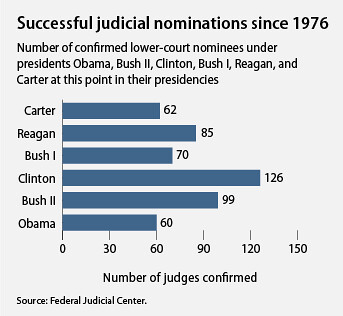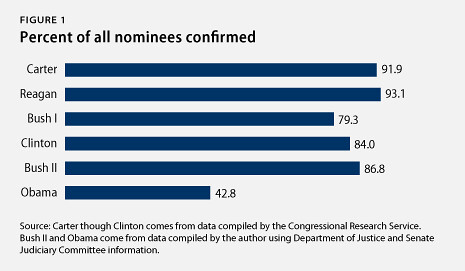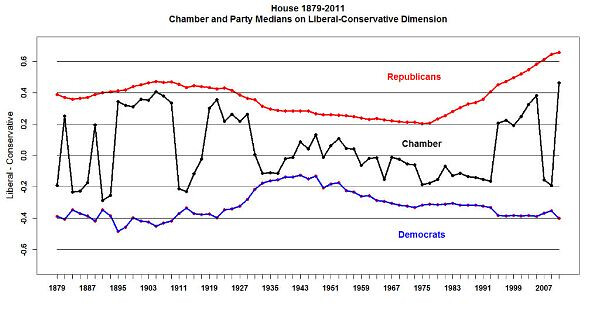It's rare that a criminal publicly announces his intent to commit a felony. But when it came to their scorched-earth campaign of obstructionism to destroy the Obama presidency, GOP leaders weren't shy about their plans. While 15 top Republicans schemed in private on the night of Obama's inauguration to "challenge them on every single bill and challenge them on every single campaign," conservative mouthpieces like Bill Kristol and Rush Limbaugh promised gridlock at every turn.
Three years later, as Congressional scholars Norman Ornstein and Thomas Mann suggest in their new book, the Republicans' foul deed is done. From its record-setting use of the filibuster and its united front against Obama's legislative agenda to blocking judicial nominees and its unprecedented (and repeated) threats to trigger a U.S. default, the most conservative Congress in over 100 years has stopped Washington dead in its tracks. But judging from the muted reaction from the press and a public evenly split in its Congressional preference, Republicans are getting away with their crime.
You don't need to work for CSI to identify the guilty party in the death of Washington.
Even before Barack Obama took the oath office, Republicans leaders, conservative think-tanks and right-wing pundits were calling for total obstruction of the new president's agenda. Bill Kristol, who helped block Bill Clinton's health care reform attempt in 1993, called for history to repeat on the Obama stimulus - and everything else. Pointing with pride to the Clinton economic program which received exactly zero GOP votes in either House, Kristol in January 2009 advised:
"That it made, that it made it so much easier to then defeat his health care initiative. So, it's very important for Republicans who think they're going to have to fight later on health care, fight later on maybe on some of the bank bailout legislation, fight later on on all kinds of issues."
And so, as the chart below reveals, it came to pass.
Time after time, President Obama could count the votes he received from Congressional Republicans on the fingers (usually the middle one) of one hand. The expansion of the State Children's Health Insurance Program (S-CHIP) to four million more American kids earned the backing of a whopping eight GOP Senators. (One of them, Arlen Specter, later became a Democrat.) Badly needed Wall Street reform eventually overcame GOP filibusters to pass with the support of just three Republicans in the House and Senate, respectively. Last summer, it took 50 days for President Obama to get past Republican filibusters of extended unemployment benefits and the Small Business Jobs Act. As for the DISCLOSE Act, legislation designed to limit the torrent of secret campaign cash unleashed by the Supreme Court's Citizens United ruling, in September Republican Senators prevented it from ever coming to a vote.
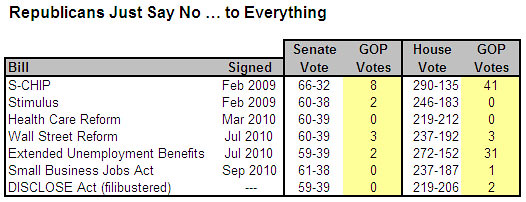
The one-way street that is bipartisanship in Washington was most clearly on display during each party's attempts to pass tax cuts and economic stimulus. While some turncoat Democrats (like debt super committee member Max Baucus) helped Reagan and Bush sell their supply-side snake oil, Republicans were determined to torpedo new Democratic presidents:
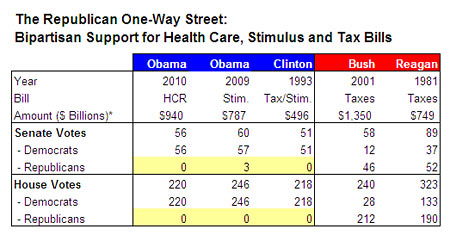
Consider the 2009 American Recovery and Reinvestment Act now credited with saving up to three millions jobs and preventing what McCain economic adviser Mark Zandi called "Depression 2.0." Obama's margins in the passage of the final $787 billion conference bill were almost unchanged from the earlier versions produced by the House and Senate. Despite then Minority Whip Eric Cantor's earlier claim that Obama's bipartisan outreach was a "very efficient process," the President was shut out again by Republicans in the House. In the Senate, the stimulus actually lost ground, as Ted Kennedy's absence and the no-vote of aborted Commerce Secretary Judd Gregg made the final tally 60-38. So much for Minority Leader Mitch McConnell's January 2009 statement that the Obama stimulus proposal "could well have broad Republican appeal."
(If that all-out Republican obstructionism sounds familiar, it should. When Clinton's 1993 economic program scraped by without capturing the support of even one GOP lawmaker, the New York Times remarked, "Historians believe that no other important legislation, at least since World War II, has been enacted without at least one vote in either house from each major party.")
But if Barack Obama's legislative agenda ran into endless Republican obstacles in Congress, his judicial nominees hit a brick wall. The same Republicans who decried the judicial filibuster and demanded an "up or down vote" for President Bush's selections to the federal bench have stymied Obama's choices at a record rate.
Citing research by the Alliance for Justice, in June 2011 ThinkProgress reported:
[T]he Senate confirmed fewer of [Obama's] district and circuit nominees than every president back to Jimmy Carter, and the lowest percentage of nominees - 58% - than any president in American history at this point in a President's first term. By comparison, Presidents George W. Bush, Clinton, George H.W. Bush, Reagan and Carter had 77%, 90%, 96%, 98%, and 97% of their nominees confirmed after two years, respectively.
Senate Republicans' mass obstruction of Obama's judges stands in stark contrast to the treatment afforded to past presidents. Indeed, the Senate confirmed fewer judges during Obama's first two years in office than it did during the same period in the Carter Administration, even though the judiciary was 40 percent smaller while Carter was in office.
As dismal as that record is, it's actually an improvement from a year earlier, when only 43& of President Obama's judicial appointments had been confirmed:
Not content that federal judges are now retiring at twice the rate that replacements are being confirmed, Congressional Republicans headed off to their five-week August recess without taking action on 20 Obama judicial nominees (16 of them approved unanimously by the Judiciary Committee). As ThinkProgress also noted, the rapidly growing caseload for the under-sized federal judiciary means that "even if all judicial vacancies were filled, we'd still need more judges." It's no wonder Chief Justice John Roberts - certainly no friend of Barack Obama and the Democracy Party - urged action last year to address "the persistent problem of judicial vacancies."
Republican obstructionism hasn't merely destroyed the nominations of judicial standouts like Goodwin Liu, who later assumed a position on the Supreme Court of California. High profile Obama administration nominees like Dawn Johnson and Peter Diamond, the latter a Nobel Prize-winning economist, never saw the light of day in the Senate. And having already dissuaded President Obama from choosing now-Senate candidate Elizabeth Warren to head the new Consumer Financial Protection Bureau created by Congress last year, Minority Leader Mitch McConnell announced that the GOP would block any and all comers put forward by the White House:
"It's not sexist. It's not Elizabeth Warren-specific," McConnell spokesman Donald Stewart said. "It's any nominee."
(When President Obama used a recess appointment to put Richard Cordray in charge of the CFPB, McConnell and Senate Republicans filed suit.)
As Ian Millhiser reported in April 2011, Republicans blocked scores of Obama nominees over matters large and small. Often, very small:
Following in the footsteps of Sen. Richard Shelby (R-AL), who placed a hold on over 70 of President Obama's nominees last year in order to extort tens of billions of dollars worth of pork for his state, Sen. Lindsey Graham (R-SC) threw a similar tantrum yesterday over a mere $50,000. Graham (R-SC) promised to shut down all executive branch and judicial confirmations in the Senate until he gets $50,000 to conduct a study on deepening the Port of Charleston.
Since House Republicans assumed their new House majority in January 2011, President Obama's agenda has been effectively shut down. But even before their successful hostage-taking of the federal budget and U.S. debt ceiling, Senate Republicans for years had been shattering filibuster records to stop Democratic legislation dead in its tracks.
As it turns out, the Roadblock Republicans started their work when Democrats recaptured the Senate in 2007, only to redouble their efforts when Barack Obama walked into the Oval Office in 2009. Back in 2007, former Senate Minority Whip Trent Lott explained the successful Republican strategy for derailing the new Democratic majorities in the House and Senate:
"The strategy of being obstructionist can work or fail. So far it's working for us."
And the Republicans of the 110th Congress were just getting warmed up. The Senate GOP hadn't merely shattered the previous records for filibusters. As McClatchy reported in February 2010, the Republicans of the 111th Congress vowed to block virtually everything, counting on voters to blame Democrats for the GOP's own roadblocks. And as McClatchy explained in an updated analysis Tuesday, thanks to the Republicans' record-breaking use of the filibuster (see chart at top), "Congress isn't just stuck in partisan and ideological gridlock: It's broken."
As even Robert Samuelson (no friend of Democrats) acknowledged, "From 2003 to 2006, when Republicans controlled the Senate, they filed cloture 130 times to break Democratic filibusters. Since 2007, when Democrats took charge, they've filed 257 cloture motions." The Republicans didn't merely eviscerate the old mark for cloture motions and filibusters after their descent into the minority in 2007. As Paul Krugman detailed in late 2009, the GOP's obstructionism has fundamentally altered how the Senate does - or more accurately, doesn't do - business:
The political scientist Barbara Sinclair has done the math. In the 1960s, she finds, "extended-debate-related problems" -- threatened or actual filibusters -- affected only 8 percent of major legislation. By the 1980s, that had risen to 27 percent. But after Democrats retook control of Congress in 2006 and Republicans found themselves in the minority, it soared to 70 percent.
Now, as the Washington Post highlighted last week, total obstructionism is the new normal for Republicans.
The meaning of that shocking picture is clear. As the Post's Ezra Klein summed it up:
Most observers agree that its basic point is correct: We're seeing many more filibusters today than we ever did before. But I actually think that's the wrong way to think about it.
The issue today isn't that we see 50, or 100, or 150 filibusters. It's that the filibuster is a constant where it used to be a rarity. Indeed, it shouldn't even be called "the filibuster": It has nothing to do with talking, or holding the floor. It should be called the 60-vote requirement. It applies to everything now even when the minority does not specifically choose to invoke it. There are no longer, to my knowledge, categories of bills that don't get filibustered because such things are simply not done, though there are bills that the minority chooses not to invoke their 60-vote option on. That's why Harry Reid says things like "60 votes are required for just about everything," though there are a small number of bills where the majority uses the budget reconciliation process to short-circuit the 60-vote requirement.
And that, James Fallows lamented following the headline below from The Hill, represents "a conservative coup d'état."
A conservative coup, indeed. Studies by political science professors Keith Poole and Howard Rosenthal show Republicans are responsible for the hyper-polarization of Congress. The GOP moved so far to the right that the House is now the most conservative it has been in the last 133 years.
As It's Even Worse Than It Looks co-author Norm Ornstein concluded:
"When you look at the data, including voting records ... the Democrats have moved left, to probably their own 25 yard line. President Obama's probably around the 40. The Republicans have moved behind their own goal post."
The result isn't just what Dana Milbank mocked as "our do -almost-nothing Congress." The institution is now wildly unpopular, with approval rating consistently under 20 percent. Despite the GOP"s strangling of Capitol Hill, voters still give the GOP a narrow edge in the generic Congressional ballot. As for the media standing over the still warm body of Congress, both Democrats and Republicans must be complicit. As an incredulous Greg Sargent put it, "Only one party's to blame? Don't tell the Sunday shows."
For his part, Ornstein concluded the Republicans' crime has gone unpunished, correctly noting that "there hasn't been a price to pay for obstruction for obstruction's sake." To put it another way, the Republican Party as promised killed Washington. Over three years later, they are still getting away with murder.
(This piece also appears at Perrspectives.)






